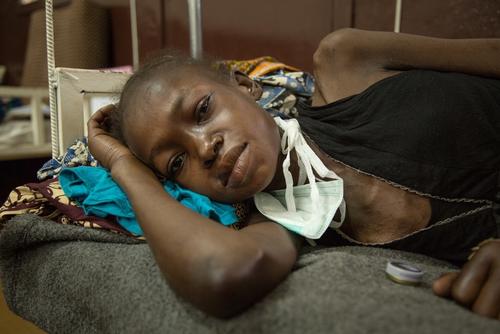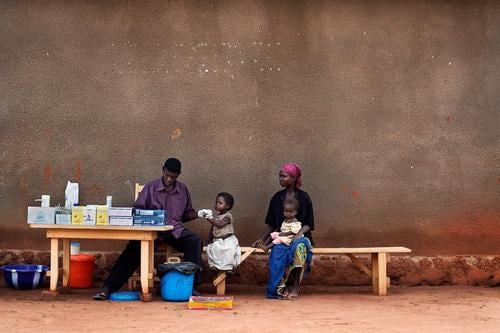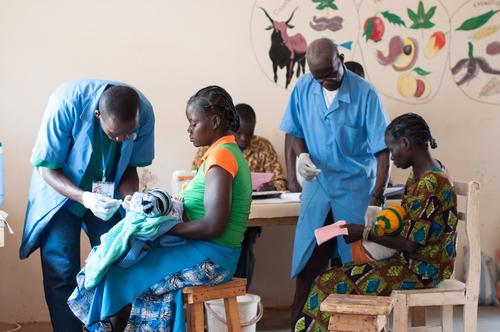Barely three months after starting a new project offering treatment for advanced HIV/AIDS in support of the Hôpital Communautaire in Bangui, Central African Republic, MSF is expanding its activities to respond to the high demand for treatment. Dr Christine Bimansha Mbombo, MSF’s medical referent, bears witness.
As a long-serving MSF doctor I’ve seen my share of difficult situations. But I was still shocked when I started working in our Bangui HIV/AIDS project. It’s just incredible that, in our day and age, people still die of AIDS!
Only 18 per cent of the people living with HIV in CAR are on antiretroviral treatment, and we see the consequences of such low access to these lifesaving drugs. We also see the consequences of the ongoing crisis with many people having interrupted their treatment or lost to follow up.
In the large general hospital where we support the internal medicine ward and the lab, 40 per cent of all admissions are HIV positive and 20 per cent of the deaths are due to AIDS, even though the country is considered as having a low HIV prevalence

Even though we knew there were unfulfilled needs for AIDS treatment, we did not expect such a high demand for our services. When we opened the project in collaboration with the Hôpital Communautaire, we had 16 beds and were equipped to care for about 55 patients a month. We now receive over 100 patients a month – far beyond our capacity. As a result our patients can only stay four or five days in the hospital to make space for others, even though they are so sick that they should be hospitalized for at least two weeks. So we’re expanding our capacity to 40 beds, including ten in intensive care.
What’s more, half of our patients don’t even know that they have the virus. Stigma is so strong that those who are know their status are often seen as pariahs in the society, abandoned by all. Announcing an HIV positive status to our patients is extremely difficult. I would say that 5 to 10 per cent of the newly diagnosed in our service completely deny what we tell them, particularly the most educated. Some patients will take their treatment for opportunistic infections, but still refuse to take the antiretrovirals that will keep their HIV virus in check and prevent them from falling ill again. I could say these patients would rather be dead than living with HIV. Last month, the rate of readmission of our patients was 5 per cent.

Before my Bangui posting I was working in Tete, Mozambique where MSF supports HIV treatment in the community. As is mostly the case in high prevalence countries of Southern and Eastern Africa, our patients can tell you exactly how their immune system is reacting to the virus, they ask to have their viral load tested. But Bangui is another world altogether. When I arrived, I was wondering: “what is going on here? Can’t people get a minimum of information, through the media, in the community?” But no, there’s nothing really.
My work here is difficult, but our project is necessary. There is no other place in Bangui to get free hospital care for late stage AIDS cases. The disease is so neglected that there is no clear protocol for the treatment of opportunistic infections, and medicines are hard to come by. Contrary to Mozambique, where nurses can initiate people on ARV, only a handful of doctors in the country are able to do so.
Lack of access to healthcare is a reality for most people in CAR, but it’s even more difficult for HIV patients who need uninterrupted, lifelong daily treatment. Those who have been displaced by the violence don’t know how they can get back on treatment. Once you’ve found a treatment centre, it can be difficult, costly and unsafe to travel long distances to get there and pick up the medicine regularly.
I don’t want to say that our project is just a drop of water in the ocean; we’re treating close to 100 patients a month, and before us there was nothing. But I can’t help but wonder: what about those who we still cannot reach?”
MSF has been working in CAR since 1997. The Bangui project, in collaboration with the public establishment Hôpital Communautaire, started in March 2016 and, as of July 2016, is offering HIV and TB treatment to around 100 people a month. In MSF-supported facilities countrywide, some 4,813 patients are on antiretrovirals, about 19% of the national cohort, including in prefectures with the highest HIV prevalence. Patients are offered diagnosis, treatment and adherence support free of charge. Provision of HIV services in CAR is challenging, with recurrent bouts of violence further compounding an already fragile health system.





